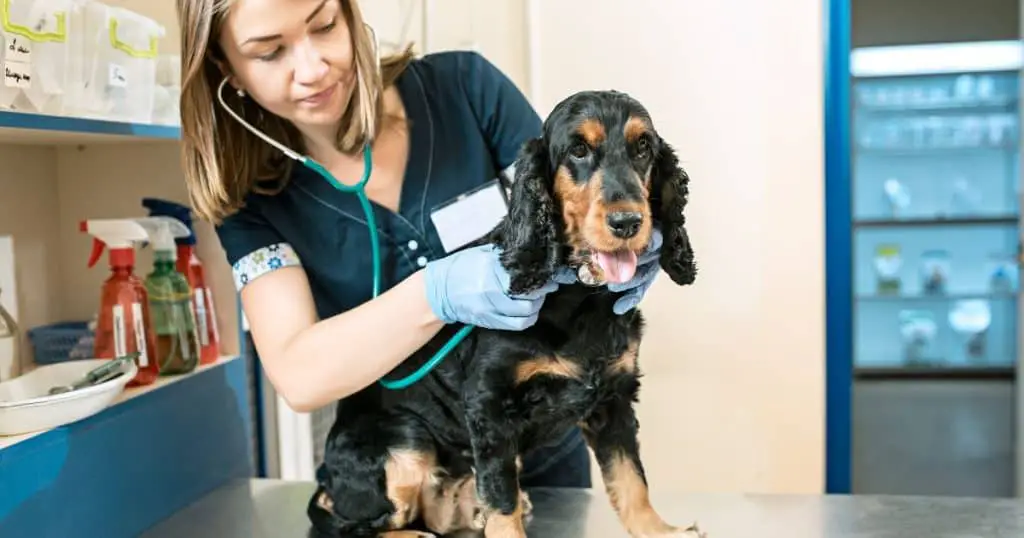Table of Contents
Dogs are known for their love of food and their willingness to eat just about anything. However, when it comes to feeding dogs, it’s important to know which foods are safe and which ones can cause harm. Apples are a common fruit that many people enjoy and often wonder if it’s safe for their furry friends to eat as well.
Are Dogs Allergic to Apples?
While apples are generally considered safe for dogs to eat, some dogs may have an allergic reaction to them. Allergies in dogs are not uncommon, and they can be caused by a variety of factors, including food. It’s important for dog owners to be aware of the signs of an allergic reaction and to know what to do if their dog experiences one.
In this article, we will explore the question of whether or not dogs are allergic to apples. We will discuss the benefits and risks of feeding apples to dogs, the signs of an allergic reaction, and what to do if your dog has an allergic reaction to apples. By the end of this article, you will have a better understanding of whether or not apples are safe for your furry friend to eat.
Can Dogs Eat Apples?

Dogs can eat apples and, in fact, they are a great source of vitamins and fiber for our furry friends. Apples are packed with vitamin C, vitamin A, potassium, and antioxidants, which can help boost your dog’s immune system and promote healthy digestion.
Benefits of Apples for Dogs

Apples make a great snack for dogs because they are low in fat and calories. They also contain fiber, which can help regulate your dog’s digestive system and promote a healthy weight. Additionally, the antioxidants in apples can help protect your dog’s cells from damage caused by free radicals.
Apples can also help freshen your dog’s breath and clean their teeth. The crunchy texture of apples can help remove plaque and tartar buildup on your dog’s teeth, reducing their risk of developing dental problems.
Potential Risks of Apples for Dogs

While apples are generally safe for dogs to eat, there are a few things to keep in mind. First, you should always remove the seeds and core of the apple before giving it to your dog. Apple seeds contain small amounts of cyanide, which can be toxic to dogs in large quantities.
Additionally, some dogs may be allergic to apples or may have trouble digesting them. Signs of an apple allergy in dogs can include itching, hives, and gastrointestinal upset. If you notice any of these symptoms after giving your dog apples, you should stop feeding them to your dog and consult with your veterinarian.
Finally, while apples can be a healthy treat for dogs, they should only make up a small portion of your dog’s diet. The majority of your dog’s calories should come from a well-balanced dog food diet that meets their nutritional needs.
Symptoms of Apple Allergies in Dogs

When dogs are allergic to apples, they may exhibit a range of symptoms that can vary in severity. Some of the most common symptoms of apple allergies in dogs include:
- Itching and scratching
- Hives and rashes
- Swelling of the face, ears, and paws
- Ear infections
- Vomiting and diarrhea
- Difficulty breathing
- Loss of appetite
- Weakness and lethargy
The severity of these symptoms can vary depending on the individual dog and the extent of their allergic reaction. In some cases, dogs may experience a severe allergic reaction known as anaphylaxis, which can be life-threatening if not treated immediately.
If you suspect that your dog is allergic to apples, it’s important to seek veterinary care right away. Your veterinarian can perform an allergy test to determine the specific allergen that is causing your dog’s symptoms and recommend an appropriate treatment plan.
Diagnosing Apple Allergies in Dogs

Diagnosing apple allergies in dogs can be a challenging task, as the symptoms of apple allergies are similar to those of other allergies. However, there are some steps that veterinarians can take to determine whether a dog is allergic to apples or not.
The first step in diagnosing apple allergies in dogs is to perform a physical examination. The veterinarian will look for any signs of skin irritation, such as redness or itching, as well as any other symptoms that may indicate an allergic reaction. They will also ask the owner about the dog’s diet and any recent changes that may have been made.
If the physical examination suggests that the dog may be allergic to apples, the veterinarian may perform an intradermal skin test or a blood test to confirm the diagnosis. In an intradermal skin test, a small amount of apple extract is injected under the dog’s skin, and the veterinarian will observe the site for any signs of an allergic reaction. In a blood test, the veterinarian will measure the dog’s level of immunoglobulin E (IgE) antibodies, which are produced in response to an allergen.
If the diagnosis is confirmed, the veterinarian will work with the owner to develop a treatment plan. This may include avoiding apples in the dog’s diet, as well as providing medication to manage the symptoms of the allergy. In some cases, the veterinarian may also recommend immunotherapy, which involves gradually exposing the dog to small amounts of the allergen over time in order to desensitize their immune system.
It is important to note that while apple allergies are relatively rare in dogs, they can be serious if left untreated. If a dog is exhibiting symptoms of an allergic reaction, it is important to seek veterinary care as soon as possible. With proper diagnosis and management, however, most dogs with apple allergies can live happy, healthy lives.
Treatment for Apple Allergies in Dogs

Part of the treatment process for allergies in dogs is identifying the source of the problem. To test for allergies, the only effective way is to use the elimination diet to take away all types of dog foods and treats and then reintroduce them one at a time. This process can be time-consuming and requires patience and careful observation.
If your dog is allergic to apples, the most effective way to treat the allergy is to avoid feeding them apples. In case of accidental ingestion, contact your veterinarian immediately. They may prescribe antihistamines or corticosteroids to alleviate the symptoms, depending on the severity of the allergic reaction.
It’s important to note that while corticosteroids can be effective in reducing inflammation and itching, they can also have side effects such as increased thirst, appetite, and urination, as well as lethargy and gastrointestinal upset. Therefore, it’s important to follow your veterinarian’s instructions carefully and monitor your dog closely while they are on medication.
If you suspect that your dog has an apple allergy, it’s important to consult with your veterinarian to confirm the diagnosis and develop an appropriate treatment plan. In addition to avoiding apples, your veterinarian may recommend a hypoallergenic diet or other dietary supplements to help manage the allergy.
Overall, the key to managing apple allergies in dogs is to identify the source of the allergy and take steps to avoid it. With proper treatment and management, most dogs with apple allergies can lead happy and healthy lives.
Preventing Apple Allergies in Dogs

Preventing apple allergies in dogs is possible with a few simple steps. Firstly, it is important to introduce new foods gradually and in small amounts. This will help to reduce the risk of an allergic reaction.
Secondly, it is important to choose high-quality apples that are fresh and free from pesticides. Organic apples are a good option as they are grown without the use of harmful chemicals.
Thirdly, it is important to prepare the apples properly before giving them to your dog. This involves washing and scrubbing the apples to get rid of any pesticide or germs from their surface. The skin should be peeled, and the seeds and cores removed.
Fourthly, it is important to monitor your dog for any signs of an allergic reaction after giving them apples. Symptoms of an allergic reaction can include itching, swelling, vomiting, and diarrhea. If you notice any of these symptoms, stop giving your dog apples immediately and consult with your veterinarian.
Finally, it is important to keep in mind that not all dogs are allergic to apples. In fact, apples can be a healthy and nutritious addition to your dog’s diet when given in moderation. Apples are a great source of vitamin C, vitamin A, potassium, and antioxidants. They are also loaded with fiber, which helps to promote healthy digestion.
Conclusion
While apples are generally considered safe for dogs to eat, some dogs may have an allergic reaction to them. Symptoms of an allergic reaction can include vomiting, diarrhea, difficulty breathing, and even anaphylaxis, which is a life-threatening emergency. If your dog has never eaten apples before, it’s best to introduce them slowly and in small amounts to see how they react.
It’s also important to note that while apples can be a healthy snack for dogs, they should not be a substitute for a well-balanced diet. Dogs need a variety of nutrients to thrive, including proteins, fats, carbohydrates, vitamins, minerals, and water. Apples are a good source of vitamin C and fiber, but they lack protein and fatty acids, which are essential for your dog’s health.
If you suspect that your dog may have an apple allergy, it’s important to talk to your veterinarian. They can help you determine the cause of your dog’s symptoms and recommend the best course of treatment. Your veterinarian may also recommend that you avoid feeding your dog apples altogether or limit their intake.
In conclusion, while apples can be a nutritious snack for dogs, it’s important to be aware of the potential for allergic reactions and to feed them in moderation as part of a well-balanced diet. If you have any concerns about your dog’s diet or health, it’s always best to consult with your veterinarian.




Leave a Reply
You must be logged in to post a comment.